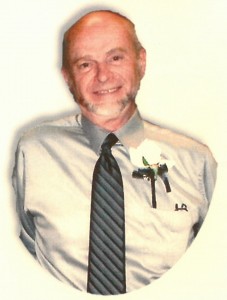“The fact that we are helping people learn and earn money while they make these urns and helping people who are in a state of need, that’s a real win-win,” said Sherry Becker, director of the North Iowa Vocational Center (NIVC), a nonprofit training center for the disabled in Mason City. “It lets us advance our mission, it lets us generate some dollars that we can use to do that, and it meets an emerging need. It really is a win-win.”
KCCI-TV from 11/17/14
Crowe, 66, left his job at NIVC early on the afternoon of May 21. He was heading home on his motorcycle, with plans to work on a busted lawnmower, when a 70-mph car ran him down from behind as he attempted a right turn near his Nora Springs, Iowa, home.
“I went past the accident, but I didn’t know it was him,” Nancy Crowe said in an October interview. “When I got home, he wasn’t there, so I went back. The sheriff met me halfway.”
For the widow, life changed immediately. Nancy Crowe quickly switched homes so she wouldn’t have to drive daily past the crash site. She found herself awash in the sudden torrent of unplanned expenses and new, suddenly necessary decisions.
Except for one.
“This is what he wanted, so this is what we did,” she said, tapping the top of one of the urns. “I think it meant more
because it was the people he worked with who had done it.”

If he had lived, Crowe would have been NIVC’s supervisor for a four-person project that now is poised to turn out as many as 200 wooden cremation urns each year.
The urns, square wooden boxes roughly 12 inches on a side, were launched for sale in November out of NIVC’s Mason City headquarters and at www.UrnsNorthIowa.com. The business was created after NIVC officials early last year approached CIRAS for help in replacing a money-losing can-and-bottle recycling business.
NIVC Services Inc. last year provided 456 disabled Iowans with various forms of job training, mostly through businesses run by the agency or via contracts made with multiple north Iowa companies. The businesses—two thrift shops, a pallet-production operation, and a parts-packaging facility—provided more than 60 percent of NIVC’s revenue in the most recent fiscal year. But in the past, the volume of work has been inconsistent.
“Because we outsource work from other businesses, our workflow is dependent on other businesses,” Becker said. “If we have a lot of contracts that get slow, then
there’s nothing for people to do. We need some sort of work that we can do when there’s a [lower] demand, so we can manage it ourselves.”
CIRAS, which had done multiple previous projects with NIVC, led officials through a wide-ranging Innovation Cycle discussion. Talk quickly centered on ways that the nonprofit could broaden its long-held expertise in doing hands-on work with wood.
“When we work in ideation, we help people focus on what they do great, and then try to expand on that,” said CIRAS project manager Paul Gormley. “So you will have a very long list of ideas, and you have to narrow that list down. We helped them narrow their ideas down, then we helped them vet them.”
“We try to help companies focus on who the client is and if that need is really real,” Gormley said. “In this particular case it was.”
Conversations with local Veterans Administration officials convinced NIVC of a growing need to provide cheap alternatives for the funerals of indigent veterans. Public assistance exists to pay for a veteran’s funeral, Becker was told, but not for a container to hold cremated remains. With expensive urns financially out of reach, families frequently must carry cremated loved ones home or to a cemetery in shoeboxes or plastic bags.
NIVC plans to sell its hardwood urns for $96. The goal is to create a quality product that also will fill a financial need—both for NIVC and, on the other end, for cash-strapped veterans’ families.
Becker said the agency will promote its urns both to the general public and among military veterans. (NIVC had a table at the November meeting of the Iowa State Association of Counties in a bid to make local veterans’ officials aware of the urns.) But veterans alone will not keep the urn business financially viable.
“We’ve got to count on the bigger part being the website,” she said. “We don’t have enough veterans here in northern Iowa for this to take off.”
But David Crowe was a veteran, and his widow still takes comfort in his former work.
“They’re creating a job for these people, and they’re doing [the work] well,” Nancy Crowe said. “It’s just a good fit all around.”